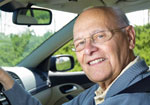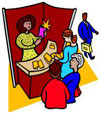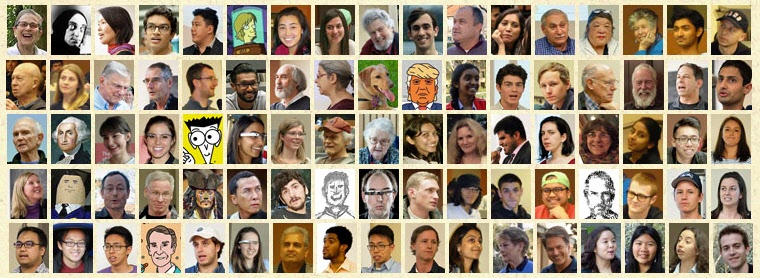| |
|
|

|
|
ATLAS |
|
|
Assistive
Technology
Laboratory
at
Stanford |
|
|
|
Technology
and design benefitting individuals with disabilities and older adults in the
local community |
January 2, 2018 |
|
|
|
|

Perspectives is the newsletter of the
Stanford course,
Perspectives in Assistive
Technology.
Happy New
Year!
This issue invites you
to attend the first class session,
submit suggestions for automotive /
driving projects, and
encourages your participation in the course's
Assistive Technology Faire.
|
Perspectives in Assistive Technology is a Winter
Quarter Stanford course - now in its twelfth year - that explores the
design, development, and use of assistive technology that benefits people with
disabilities and older adults. It consists of semi-weekly classroom
discussions; lectures by notable professionals, clinicians, and
assistive technology users; tours of local medical, clinical, and
engineering facilities; student project presentations and demonstrations; an
assistive technology faire; and a film screening. Organization of
the coming year's course is underway, with the first class session in
January. |
Course
News
|
Student Enrollment - The course
enrollment continues to be in flux with the following enrollment: 4 for the
seminar option, 7 for the individual project option, and 38 for the team
project option. |
|
Assistive Technology Faire - The
second Assistive Technology Faire participant has been registered: BeeLine
Reader. |
First class
session of the twelfth season - Tuesday, January 9th at
4:30pm:
|

|
Course Overview &
Introduction to Assistive Technology
David L.
Jaffe, MS
Stanford University -
Mechanical Engineering Design Group |
Abstract: This presentation will provide an
overview of the course and a brief introduction to Assistive Technology
including a definition of terms, demographics, goals of rehabilitation,
perceptions of disability, the needs of people experiencing disabilities,
political correctness, and numerous examples of commercial assistive technology
products, research efforts, and students' projects.
Biosketch: David L. Jaffe holds a BS
degree in Electrical Engineering from the University of Michigan and a MS
degree in Biomedical Engineering from Northwestern University.
Prior to coming to Stanford, he was a Research
Biomedical Engineer at the VA Palo Alto Health Care System's Rehabilitation
Research and Development Center. At the VA his interests were designing,
developing, testing, and bringing to market microcomputer-based devices for
veterans with disabilities including communication, mobility, and information
systems. He has worked on several VA assistive technology research projects
including an powered wheelchair interface for individuals with quadriplegia, an
electro-mechanical fingerspelling hand that served as a communication device
for people who are deaf/blind, a system that explored virtual reality
techniques to train individuals with gait deficits to improve their walking,
and a project that employed a computer-based simulation system to assess and
improve the driving ability of individuals after brain injury.
In addition to organizing this course, ENGR110/210:
Perspectives in Assistive Technology, he contributes to other Stanford
courses including defining the quarterly course projects in ME218: Smart
Product Design, coaching project teams in ME113: Mechanical Engineering
Design, BioE141: Bioengineering Senior Capstone Design, ME170:
Mechanical Engineering Design - Integrating Context with Engineering,
and ME310: Engineering Design Entrepreneurship and Innovation as well as
mentoring students working on assistive technology projects throughout the
year.
|
Attend a lecture - The
schedule of guest lectures has been finalized.
Class sessions will be held on Tuesdays and Thursdays from
4:30 to 5:50pm starting
Tuesday, January 9th and are open to the
greater Stanford community. You are most welcome to sit in on any class
sessions that interest you. You need not be a Stanford student and there is no
required signup, enrollment, or charge. The class will meet in a large, tiered,
accessible classroom on campus in the Thornton Center, adjacent to the Terman
Fountain and near the Roble Gym, the same venue as last year. Here are the
parking options, maps, and directions to the
classroom. |
 |
|

Suggestions for automotive /
driving projects - For the Spring Quarter Mechanical Engineering
senior capstone course, I am seeking student project suggestions related to
automobiles or driving: real problems experienced by an individual with a
disability or an older adult in the local community that affects their ability
to drive or otherwise access transportation. Other suggestions that broadly
relate to walking or mobility are also welcome.
Please email your problem description and important
features of what a solution should do (but not how to achieve them, as that
will be addressed by the students). |

You are invited to participate
in the Assistive Technology Faire - This sixth annual course
event will provide an opportunity for students and community members to get an
up-close look at a variety of assistive technology devices and learn about
available services. Users of assistive technology products as well as
small companies and agencies serving individuals with
disabilities and older adults are encouraged to bring assistive technology
devices and information to display, demonstrate, and discuss. Please browse to
the Call for Assistive Technology Faire Participants
webpage and contact me if you would like to be a part of this event as a
user or vendor of assistive technology products or services. Everyone is
welcome to attend the faire.
The Faire will start at 4:30pm on
Thursday, March 1st just outside the
classroom, Thornton 110.
Here are Dave's
and Arne's photos from last year's
Faire. |
Support the course - Funding in
any amount for the course and student projects is always welcomed. Monetary
gifts support approved project expenses, administrative costs, honoraria for
guest lecturers, and the end-of-term celebration. Refer to the
Team Project Support webpage for more
information.
Email questions, comments, or
suggestions - Please email
me if you have general questions, comments, or suggestions regarding the
course. Thank you again for your interest.
Dave
|

To unsubscribe from this newsletter, please email
Dave. |
|







